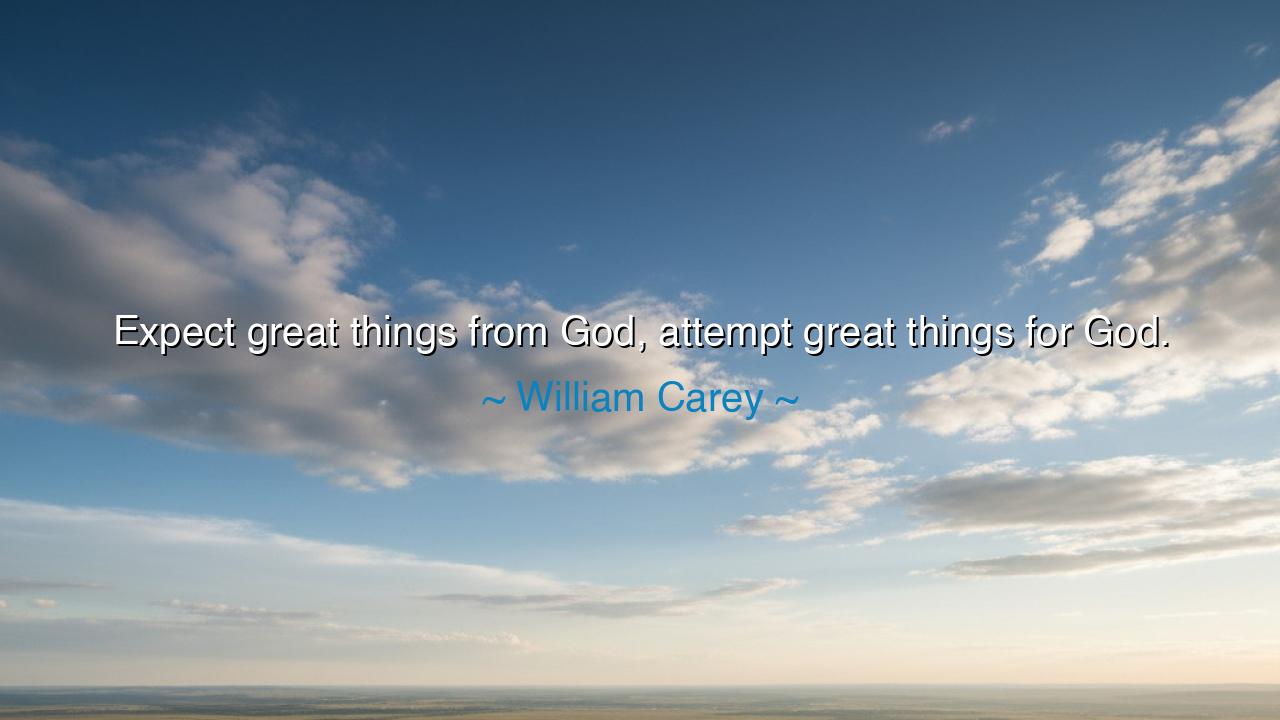
Expect great things from God, attempt great things for God.






Hearken, O seekers of wisdom, and attend to the words of William Carey, a man whose faith and vision transformed worlds, who proclaimed: “Expect great things from God, attempt great things for God.” At first glance, these words may seem a simple exhortation of piety, yet beneath them lies a profound meditation on faith, courage, and the harmonious interplay between trust and action. The ancients understood well that the divine calls not only for reverence, but for the human spirit to rise in bold endeavor, guided by purpose and devotion.
Carey begins with the first principle: expect great things from God. To live in faith is to acknowledge that the source of life, wisdom, and opportunity is vast beyond measure, and that Providence may work in ways unseen. The devout have long held this understanding: the prophets of Israel, the sages of India, and the philosophers of Greece spoke of trusting in the cosmic order, anticipating blessings, guidance, and unseen favor. Faith is the lens through which the believer perceives possibility beyond the limits of mortal vision.
Yet Carey does not counsel passive expectation. He commands that one must also attempt great things for God. Faith without action is like a seed unplanted, possessing potential yet never yielding fruit. The ancients knew this truth in all fields of human endeavor: the heroes of epic song and the architects of cities labored tirelessly, guided by devotion to a purpose higher than themselves. The measure of a life, Carey suggests, is found not only in trust, but in the courage to act upon that trust.
The essence of this wisdom lies in the synergy of reliance and effort. One does not await miracles idly, but channels energy, skill, and intellect toward the fulfillment of divine purpose. Consider Florence Nightingale, whose calling to heal and serve arose from faith and compassion. She expected that the work she undertook could transform lives, and she attempted it with tireless diligence, revolutionizing nursing and public health. Her life exemplifies Carey’s maxim: expect, and attempt boldly.
Carey’s own life illuminates the path of this principle. Born in England, he felt called to spread knowledge and faith in distant lands, ultimately journeying to India as a missionary. There he faced immense obstacles: language barriers, disease, cultural differences, and skepticism. Yet he persisted, translating scriptures, founding schools, and advancing social reform, never doubting that the work entrusted to him was supported by divine providence. His efforts transformed generations, showing that great expectation combined with great endeavor bears extraordinary fruit.
This quote also teaches that human initiative is an instrument of divine purpose. The hands and minds of men and women are the vessels through which vision and faith manifest in the world. Those who shrink from effort deny the possibility of change; those who rise to action, guided by devotion, participate in the unfolding of destiny itself. The Stoics, though not bound to religious faith, similarly held that one must act virtuously, harnessing one’s capacities in alignment with the greater order of the cosmos.
From this reflection emerges a practical lesson: cultivate a mind that trusts beyond visible evidence, and a spirit that labors with courage and persistence. Identify the noble works to which you are called—whether for God, for justice, or for the welfare of humanity—and pursue them with boldness and humility. Expect divine guidance or blessings, but attempt with fervor, persistence, and integrity, for faith without effort is barren, and effort without vision is blind.
Thus, let it be known: a life of purpose is forged at the intersection of trust and action. Expect great things from God, yet step boldly into the work He calls you to accomplish. Let faith fuel your courage, let devotion guide your hands, and let action translate expectation into enduring change. In this sacred dance of reliance and endeavor, the human spirit becomes both instrument and witness of the divine, and the ordinary is transformed into the extraordinary.






AAdministratorAdministrator
Welcome, honored guests. Please leave a comment, we will respond soon